九年级英语unit10第二课时学案
英语九年级上册Unit 10第二课时导学案
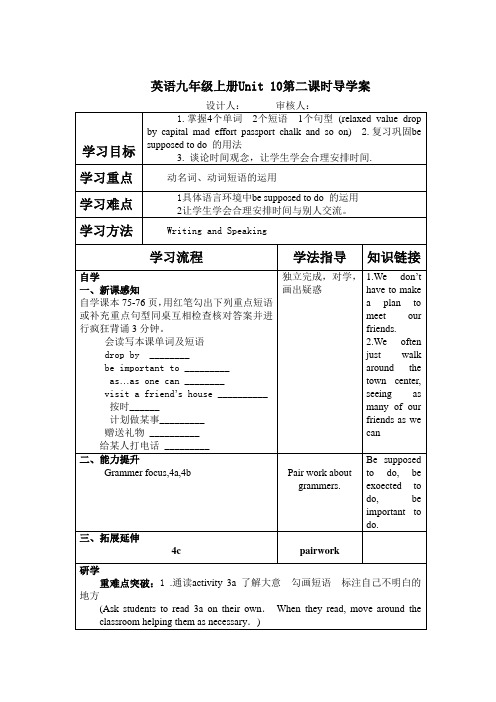
英语九年级上册Unit 10第二课时导学案1.掌握4个单词2个短语1个句型(relaxed value dropby capital mad effort passport chalk and so on) 2.复习巩固besupposed to do 的用法3. 谈论时间观念,让学生学会合理安排时间.研学重难点突破:1 .通读activity 3a 了解大意勾画短语标注自己不明白的地方(Ask students to read 3a on their own.When they read, move around the classroom helping them as necessary.)检学:一.独立完成activity4中表格组长检查完成情况二.对话活动展示3三.单项选择1 Try your best, Linda, It’s only________ difficult for you , you can do it wellbit of B a bit C a lot of D a lot2 Is there ________ in today’s newspaper?A something importantB anything importantC important somethingD impo anything3 The twins sat in the sun, ________ a story book togetherA to readB readingC to watchD watching4 Liu Jia usually goes to school without ________ breakfast, he is really pale to eat B eats C eating D eats5 Don’t be angry with him, ________ he is only five。
初三unit10第二课时教案新部编本
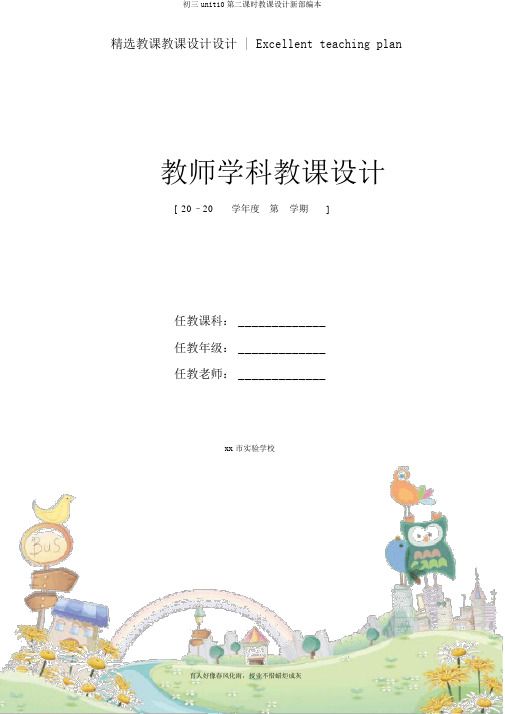
精选教课教课设计设计 | Excellent teaching plan教师学科教课设计[ 20–20学年度第__学期]任教课科: _____________任教年级: _____________任教老师: _____________xx市实验学校第二课时Step 1 Lear the new words1. by the time 直到⋯候指从去某一点到从句所示的止的一段Eg: By the time we got to his house, he had finished supper.在我到达他就已吃完了晚。
2. get —— got —— got / gotten3. oversleep—— overslept —— overslept Step 2 知点解leave—— left —— left(1)vi 走开 eg. When I got there, he had left.(2) vt 走开某地leave a place leave (A) for B身去某地(3) vt 留下,忘leave sth. in/at/on + 某地Eg. I left my key at home this morning.注意:英中表示“把某物忘在某”常用 leave + 地点 , 而不是 forget+地点eg:Unluckily, I left my book at home 不幸的是,我把忘在家里了。
Step 3 Finish 1a 1bThe keys: 1. had, got/gotten 2. had, left 3. had leftStep 4 Finish 2a 2bThe keys: 2a : 3 1 2 42b: 1. got home, realized, had left 2. got, had rung 3. walked, had started第三课时Step 1 learn 3a知点解1. go off(1)()出响声eg: The alarm went off just now. 才警响了。
人教版九年级英语全册Unit10SectionB2a2eReading教学设计
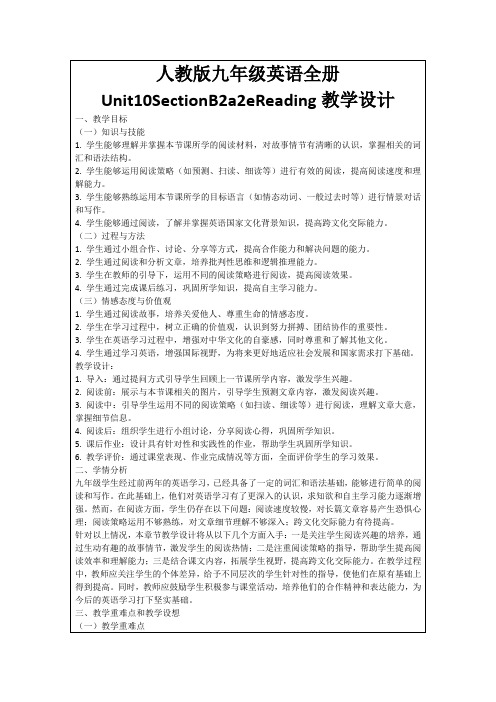
一、教学目标
(一)知识与技能
1.学生能够理解并掌握本节课所学的阅读材料,对故事情节有清晰的认识,掌握相关的词汇和语法结构。
2.学生能够运用阅读策略(如预测、扫读、细读等)进行有效的阅读,提高阅读速度和理解能力。
3.学生能够熟练运用本节课所学的目标语言(如情态动词、一般过去时等)进行情景对话和写作。
4.学生能够通过阅读,了解并掌握英语国家文化背景知识,提高跨文化交际能力。
(二)过程与方法
1.学生通过小组合作、讨论、分享等方式,提高合作能力和解决问题的能力。
2.学生通过阅读和分析文章,培养批判性思维和逻辑推理能力。
3.学生在教师的引导下,运用不同的阅读策略进行阅读,提高阅读效果。
4.学生通过完成课后练习,巩固所学知识,提高自主学习能力。
1.复习本节课所学的词汇和语法,特别是情态动词和一般过去时的用法,并完成课后练习题。
-设计目的:巩固词汇和语法知识,提高学生的实际运用能力。
2.根据本节课所学的阅读材料,编写一段对话,描述老人在海滩上的经历,并尽量运用所学词汇和语法结构。
-设计目的:培养学生的写作能力,激发学生的创造力,同时巩固所学知识。
3.学生分享预测结果,教师给予肯定并引导学生进入新课:“Today, we are going to read a story about a old man who has an interesting experience. Let's find out what happens to him.”
2.各小组讨论结束后,教师邀请小组代表分享讨论成果。
3.教师针对学生的回答给予点评,引导学生深入思考,拓展文章内容。
九年级英语全册 Unit 10 You’re supposed to shake hands Section B2导学案新版人教新目标版
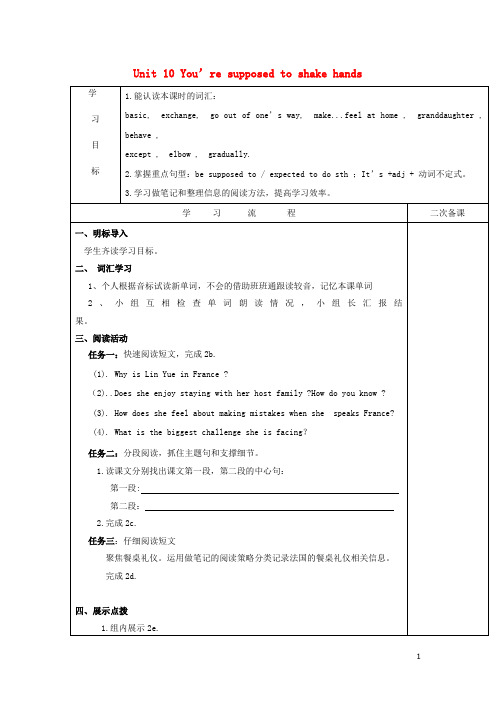
四、展示点拨
1.组内展示2e.
2..难点导学
(1).although conj虽然;尽管;然而;可是。
eg.Although my uncle is old, he looks very strong and healthy.我叔叔虽然老了,
但他看上去还是很健壮。
注意:although为从属连词,用来引导让步状语从句,它表明整个句子为
2.掌握重点句型:be supposed to / expected to do sth;It’s +adj+动词不定式。
3.学习做笔记和整理信息的阅读方法,提高学习效率。
学习流程
二次备课
一、明标导入
学生齐读学习目标。
二、词汇学习
1、个人根据音标试读新单词,不会的借助班班通跟读较音,记忆本课单词
2、小组互相检查单词朗读情况,小组长汇报结果。
Unit 10 You’re supposed to shake hands
学
习
目
标
1.能认读本课时的词汇:
basic, exchange, go out of one’s way, make...feel at home , granddaughter , behave ,
except , elbow , gradually.
3. Everyone know French ____ me. A. besides B. but C. except D. with
(二).用except与besides填空
1.除了我之外没人来。Nobody came _____me.
2 .除了这些东西之外,你还要什么?What did you want ______these?
九年级英语Unit10教案2(新人教版)_初三英[推荐五篇]
![九年级英语Unit10教案2(新人教版)_初三英[推荐五篇]](https://img.taocdn.com/s3/m/67184228cd1755270722192e453610661fd95a45.png)
九年级英语Unit10教案2(新人教版)_初三英[推荐五篇]第一篇:九年级英语Unit 10 教案2(新人教版)_初三英第二篇:九年级英语unit10教案教学目标1.学习一些公共场所的标志和说明,要能正确理解,规范自己的行为。
2.掌握本单元的词汇,特别是一些短语的用法。
3.进一步复习一些电话用语和电话对话中时态的综合运用。
4.进一步学习被动语态,特别是一般过去时态的被动语态谓语动词形式,它的肯定式、否定式、疑问式及其答语等。
5.认真学习“A visit to the Natural Museum”,掌握一些有关dinosaur的常识,丰富自己的背景知识。
6.能运用所学句型及语法结构来谈论某些物品的制作、产地和作用以及制成材料的日常用语。
Lesson 37Period: The First Period Content: Lesson 37 Properties: Recorder Teaching Objectives:1.Study the grammar: the Passive Voice in the past Simple Tense.2.Learn some new words and useful nguage Focus:on show, hundreds of, invent / invention Teaching Procedures:Ⅰ.OrganizingGreetings and make a duty report.Ⅱ.Revision1.check the homework.2.Revise the name of objects from the last unit and the Passive Voice: What's it made of? Where's it made? What's it used for? etc.Ⅲ.PresentationPresent the sentences:What's it made of?What's it used for?Then present the sentences:What was it made of?What was it used for?Ask students to compare with the groups sentences.Ⅳ.Listening.Part 1.Close books, listen to the tape and answer the questions.Where did Du Hui go yesterday?When were the old inventions on show invented?Play the tape again and make sure students can answer the questions correctly.Ⅴ.PracticeAsk some students to practice the dialogue.Then in groups and in pairs.At last let the students act it out.Ⅵ.Ask and answer Part 2.Ask the students to ask and answer in pairs according to the questions in the box.Ⅶ.PracticeAsk students to make sentences, and then change them into the Passive Voice in the past Simple T ense.Ⅷ.Workbook Do Exercise 1.Ask the students to read and complete the dialogue alone, then check the answers with the whole class.Do Exercise 2 in pairs.Ⅸ.Exercises in plete the dialogues Kate: Hello, Mary!This is Kate ________.Mary: ________ Kate.Kate: I ________ you yesterday, but you weren't ________.Mary: Oh, ________.I went to the Museum.Kate: Is it interesting?Mary: Yes, I saw many things ________ show.They were all ________ hundreds of years ________.Kate: Are there any new ________?Mary: Yes.Why not go there and have ________?Kate: That's a good idea.Ⅹ.HomeworkDo Exercise 3 in the exercise books.Make up a new dialogue.Lesson 38Period: The second period Content: Lesson 38 Properties: Tape recorder;picture Teaching objectives:1.Study the grammar: the passive voice in the Past Simple Tense.2.Learn some new words and useful nguage Focus:1.be interested in…2.on display3.be covered with4.in the 1920s' Teaching Procedures:Ⅰ.OrganizingGreetings.Ⅱ.Revision1.check the homework2.Revise the useful expressions and some new words.Ⅲ.PresentationTake out a picture and ask the students:What's this animal called?Ask some students to talk about the dinosaur.Ⅳ.Pre-reading Read over the questions with the students.Have the students guess the meaning of “on display” from the context.Then have the students discuss the questions in pairs.Ⅴ.Listening1.At first, ask students to read over the questions in the Exercise 1 in the workbook.2.Then close books and listen to tape.3.Play the tape again and answer the questions.Ⅵ.Teaching Language FocusExplain some useful expressions in the passage.1.be on a visit to…2.be interested in…3.try to do something4.be covered withe.g.He is on a visit to Shanghai.Tom is interested in English.I'll try my best to pass the exam.The ground was covered with snow.Ⅶ.Teaching Grammar1.Let the students find out these sentences with the Passive Voice in the Past Simple Tense.2.Have the students make sentences with the Passive Voice in the Past Simple Tense.Ⅷ.Workbook.Do Exercise 2 , and write down the answers.Ⅸ.Exercises in classChange the active sentences into the passive sentences:1.We bought a new TV last year.2.They didn't find the lost boy.3.My Uncle built a new house last year.4.My brother finished his homework yesterday.5.Dinosaurs laid the eggs long long ago.Ⅹ.Homework1.Read the passage.2.Finish off the workbook exercises.Lesson39 步骤1 复习1 检查家庭作业。
九年级英语全第十单元第二课时教学案人教版

课题:Unit 10 By the time I got outside, the bus had alreadyleft.课时:2nd课型:new 内容:p78 3a-3c主备教师:杨富强审核:谢海利牛俊芳李艳红李秀苹班级:姓名:学习目标:1.语言目标Learn to narrate past events.学会描述过去所发生的事情。
2、知识目标Learn to express something with Past Perfect Tense. 学习使用过去完成时态。
3、能力目标 Strengthen the consciousness of doing things regularly.做事加强连续性,有条不紊。
4、重难点:*重点单词rush, lock, empty, describe, farmer, marry基本要求:会读、会写、会用。
*重点短语go off, run off, on time, give sb. a ride, break down, show up, set off, get married, a piece of*基本要求:会读、会写、会用。
*重点语法(1)Past Perfect tense(过去完成时的用法):(2)“By the time”和“when”引导的时间状语从句基本要求:理解其含义,学以致用。
一、巧设引题:Have you ever been late for school? And have you ever been overslept? Why? Now let’s look at 3a—3c. I believe you will know the reason.二、指导自学1. The students try pronouncing these words by themselves76-77页单词速译@动词部分*发出声响 _____ ____ *冲,奔______ *跑掉,迅速离开____ ____ *锁上______ *停止运转______ ____@名词部分 *亲戚_________@词组 *准时____ ________2.Let’s close our books and fill in the following blanks.(quickly,quickly, quickly let’s see who fill in them most quickly.)①My teacher often tells me to get to school __ ______(准时).②I was late for school, because my alarm didn’t _____ _______(发出声响).三、合作探究1. My alarm clock didn’t go off, and by the time I woke up, my father had already gone into the bathroom and I had to wait for him to come out. (P78)我的闹钟坏了,因此等我醒来的时候,我父亲已经进去洗澡了,我只好等他出来。
人教版九年级英语全册Unit10SectionB(2b)教学设计

(一)教学重难点
1.教学重点:
a.掌握本节课的核心词汇和短语,如achieve, confident, effort, fail, goal, practice, success等。
b.理解并运用一般现在时和现在进行时,能够在实际语境中进行正确的语法运用。
c.能够运用目标句型进行口语交流,如:“How do you achieve your goals?”, “I practice every day.”
(二)过程与方法
在本章节的教学过程中,学生将通过以下方式提升英语能力:
1.通过小组合作、讨论等形式,培养学生的合作意识和团队精神。
2.通过听力训练,提高学生的英语听力水平,培养学生的语音感知能力。
3.通过口语交流,提高学生的英语表达能力,增强学生的自信心。
4.通过阅读训练,提播放与本节课话题相关的对话和短文,提高学生的听力水平。
3.创设写作任务,让学生结合所学词汇和句型,写一篇关于如何实现目标的短文。
(五)总结归纳
1.教师引导学生回顾本节课所学内容,强调重点和难点,确保学生能够掌握。
2.邀请学生分享在本节课中的收获和感悟,鼓励他们树立正确的目标意识,勇于面对挑战。
4.在学习方法上,学生已经具备了一定的自主学习能力,但合作学习和探究学习的能力有待提高。因此,在本节课的教学过程中,教师应注重引导学生开展合作学习,培养学生的团队协作能力。
5.由于每个学生的英语水平、学习兴趣和动机存在差异,教师应关注个体差异,因材施教,激发学生的学习潜能,提高他们的英语素养。总之,教师在本节课的教学中,要充分了解学生的实际情况,有针对性地进行教学设计,以促进学生的全面发展。
四、教学内容与过程
(一)导入新课
人教版九年级英语全一册Unit10第2课时教案

2. We value the time we spend with our family and friends in our everyday lives.
valuev.珍视,重视
教学重点:
1.掌握本部分出现的生词和词组,达到熟练运用的目标。
2.阅读短文,获得相关的信息。通过阅读练习,来提高阅读能力。
3.总结be supposed to, be expected to, be important to的不同句型。
教学难点:
1.阅读短文,获得相关信息的能力。
2.理解并运用所学的词汇及表达方式。
课题
Unit 10 You’re supposed to shake hands.
课时
第2课时Section A 3a-4c
课型:阅读课+语法课
时间:
教学/学习目标:
1.学习掌握下列词汇:relaxed, value, capital, noon, mad, effort, drop by, after all, get mad, make an effort
3)你不应该亲吻。
You ________ ________ _______ kiss.
4) ---你应该什么时候到?
---我应当7点钟到。
---When were you ________ _______ _________?
---I _______ ________ ______ _______ at 7:00.
e.g. I’ve always valued my teachers’ advice.我一直很重视老师们所给的建议。
人教版九年级英语全册Unit10SectionB(2b)优秀教学案例

1.教师引导学生总结本节课所学的知识,包括过去时态的运用、重点词汇和句型的用法等。帮助学生巩固所学内容,提高学生的归纳总结能力。
2.教师对本节课的学习内容进行拓展,引导学生思考和讨论旅行中的文化差异、旅行中的礼貌等话题,提高学生的跨文化交际能力。
(五)作业小结
1.布置作业:教师布置相关的作业,让学生运用所学知识,描述自己的旅行经历,巩固所学内容。
2.情境模拟:设计一个虚拟的旅行场景,如在旅行社咨询、预订机票、酒店等情景中,让学生在实际语境中运用所学知识,提高学生的交际能力。
(二)问题导向
1.设计一系列与旅行相关的问题,引导学生通过阅读文本和小组讨论,获取答案。如:“你最喜欢的旅行目的地是哪里?为什么?”“你曾经参观过哪些有趣的地方?”等。通过问题的引导,帮助学生深入理解文本内容,提高学生的阅读理解能力。
本节课的教学目标是全面提高学生的英语综合运用能力,使学生在知识、技能、情感态度与价值观等方面取得均衡发展。在教学过程中,我将关注每一个学生的个体差异,充分调动学生的积极性,让他们在轻松愉快的氛围中学习英语,提高他们的英语素养。
三、教学策略
(一)情景创设
1.课堂导入:以一首关于旅行的英文歌曲作为课堂导入,让学生在轻松愉快的氛围中进入学习状态。通过歌曲中的旅行场景,激发学生的旅行经历和兴趣,为后续的教学活动做好铺垫。
4.跨文化交际:通过对文本的阅读和讨论,引导学生了解不同文化背景下的旅行经历,使学生具备跨文化交际的意识,提高学生的跨文化沟通能力。
5.情感态度与价值观的培养:通过对旅行经历的学习和讨论,引导学生珍惜友谊,培养学生的团队精神,使学生在学习中学会相互关心、相互帮助。同时,引导学生明白旅行不仅仅是休闲娱乐,更是一种学习和成长的过程。
九年级英语Unit10第2课时教案

Period 2 Section A 3a - 3c【知识与能力目标】1) 学习掌握下列词汇:relaxed, value, capital, noon, mad, effort, drop by, after all, get mad, make an effort2)复习be supposed to句型。
3)如何正确的阅读课文。
【过程与方法目标】根据新课程理念,结合本课时的教学内容,开展任务型教学活动.设置多个与课文相关问题,利用略读和详读,吸引和组织他们积极参与课堂活动,学习和应用英语完成学习任务。
【情感态度价值观目标】1)通过“应该” 与“不应该”进一步了解一些国家的礼仪和对时间的看法。
2)了解不同国家的不同的时间观念,加强对中国文化的理解。
【教学重点】1) 掌握本部分出现的生词和词组,达到熟练运用的目标。
2) 阅读短文,获得相关的信息。
通过阅读练习,来提高阅读能力。
【教学难点】1) 阅读短文,获得相关的信息的能力。
2) 理解并运用所学的词汇及表达方式。
Step 1. Warm- up1. Greetings.2. Ask Ss to talk about different customs in different countries.Step 2. Lead-in1.Show pictures of Colombia and Switzerland.2. Look at the pictures and say something about the two countries.What do you know about Switzerland?What do you know about Colombia?Step 3. Reading1. Work on 3a: Tell Ss to read the article and answer the question:In which country is it OK to be 15 minutes late for dinner?Ss read the article quickly and try to find the answer to the question.2. Check the answer. Key: In Colombia.Step 4. Careful Reading1. Answer the questions according to the passages in 3a.1)Is it OK if people in Colombia arrive a bit late for a friend’s dinner?2) Who are pretty relaxed about time, Colombians or Swiss people?3) Colombians usually make plans to meet friends, don’t they?4) What are you supposed to do if you want to visit your friends in Switzerland?5) What do people in Switzerland think of time?Answers: 1) Yes, it is. 2) Colombians 3)No, they don’t. 4)I am supposed to make plans.5) They think it’s very important to be on time.2. Work on 3b. Read the passage again and fill in the chart.Step 5. Role-play 3cRole-play a conversation between Teresa and Marc. Teresa is late and Marc is mad.Use the target language:In …, you’re supposed to…A: Hi, Marc. Sorry, I’m a little late.B: Teresa, you’re 10 minutes late!A: It’s just 10 minutes! It’s no big deal!B: Well, in Switzerland, you’re supposed to…Step 6. TalkingSay something about Zhang.A: Did you have a good time at Zhang’s birthday party?B: Oh, yes. But I was a bit hurt about the way they treated my present. I gave Zhang the latest tapes from the U.K. as a birthday present when I got inside the door and what do you think happened?A: What?B: Nothing. They only said thank you, but then just put them away in a corner. I really didn’t know why. Didn’t they like them?A: Oh, That’s misunderstanding. In the west, it’s regarded as polite to open gifts as soon as they are given to express appreciation.But in China, if you did that, you might be thought greedy (贪婪的). So Chinese people tend to open the gifts after the visitors have left.Step 7. Language points1. Where I’m from, we are pretty relaxed about time.Where I’m from是一个由“where” 引导的地点状语从句。
人教版九年级英语全册Unit10SectionB(2b)教学设计

4.预习下一课的内容,提前了解关于身体其他部位疾病的表达方式,为课堂学习做好准备。
5.每位同学收集一种疾病的相关资料,包括病因、症状、治疗方法等,下节课与同学分享,增强跨文化交际能力。
作业布置要求:
1.作业内容要与课堂教学紧密结合,注重培养学生的实际运用能力。
2.作业难度要适中,既能巩固所学知识,又能激发学生的学习兴趣。
2.学生在小组内分享自己的观点,共同完成一份关于疾病话题的讨论报告。
3.各小组轮流展示讨论成果,其他小组认真倾听并给予评价。
(四)课堂练习
1.教师设计一系列练习题,包括填空、选择、改错等,让学生巩固所学知识。
2.学生完成练习题,教师给予及时反馈和指导,纠正学生的错误。
3.教师挑选部分学生的练习题进行展示,让其他学生借鉴和学习。
6.教学评价环节:
-采用多元化评价方式,如课堂表现、课后作业、口语表达等,全面评估学生的学习效果。
-注重过程性评价,关注学生在学习过程中的进步和成长。
7.教学策略:
-采用启发式教学,引导学生主动探究,培养学生的学习兴趣和积极性。
-注重个体差异,针对不同学生的学习需求,给予个性化的指导。
-创设轻松、愉快的学习氛围,让学生在愉快的氛围中学习英语。
-设计丰富的练习题,让学生在实际操作中掌握语法知识。
4.口语表达环节:
人教版九年级英语unit10教案

人教版九年级英语unit 10教学设计【教材版本】人民教育出版社九年级英语【学习内容】grammar focus, 3a, 3b and 4 of unit 9 when was it invented ?【学情分析】本节课是第九单元的第二课时, 学习任务是完成课文grammar focus, 3a, 3b and 4 部分的学习。
本单元要求学会谈论重要发明的历史及用途,然后针对各项发明的用处及特点,发表自己的看法,并说明理由。
话题一直是围绕着历史上和日常生活中的重要发明,通过使用“passive voice”形式的句型,循序渐进地展开讨论。
课本设计的活动情景能够自然地引发学生的好奇心,大家积极地投入到话题讨论中,寓教于乐,容易引起学生的兴趣;同时,它也有利于开阔学生的思路,培养创造精神,展开丰富的想象力,人人都能成为“小发明家”。
学生在第一课时学习了本单元的section a 中的1a至2c部分,基本能听懂、会说本单元要求掌握的部分重要词汇;在图片,相关信息等提示的帮助下,能较好地运用重要句型和掌握主动语态和被动语态及相互转换。
但是本班的学生两极分化比较严重,有一部分学生基础知识不牢固,前面提到的学过的单词和句型就忘得差不多了,特别是对于课文中的语法—主动语态和被动语态,被动语态的一般现在时和一般过去时混为一谈。
所以教师在课堂教学中应面向整体,及时复习相关的知识,包括重要词汇和句型,前后知识的衔接。
同时在设计上要注意活动的多样性,激发他们的兴趣,让每一位学生能得到不同程度的收获。
【单元整体目标】重点词汇:salty, sweet, sour, crispy, pleasant, potato chips, slipper, leaf, fire, scoop, light bulb, microwave oven, abacus, camera, beverage, be invented by, be used for, by mistake, by accident重点句型:when was the telephone invented? i think it was invented in 1876.技能目标:能够谈论发明的历史和用途。
人教版英语九年级全一册 Unit10 课时2 Section A 3a-3c 教案
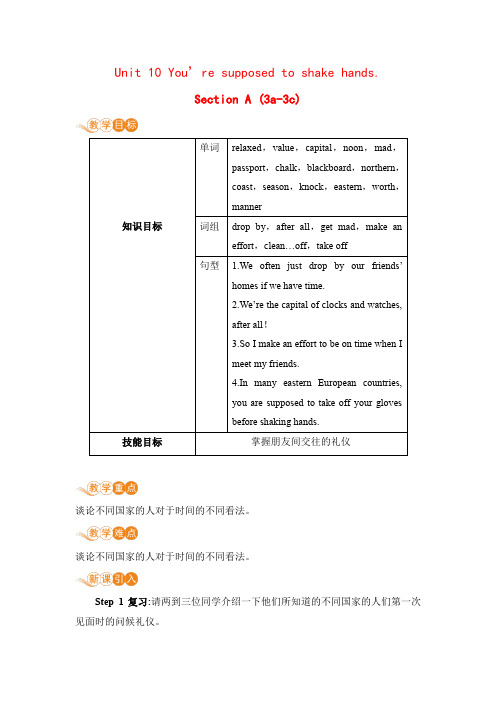
Unit 10 You’re supposed to shake hands.Section A (3a-3c)知识目标单词relaxed,value,capital,noon,mad,passport,chalk,blackboard,northern,coast,season,knock,eastern,worth,manner词组drop by,after all,get mad,make an effort,clean…off,take off句型 1.We often just drop by our friends’ homes if we have time.2.We’re the capital of clocks and watches,after all!3.So I make an effort to be on time when Imeet my friends.4.In many eastern European countries,you are supposed to take off your glovesbefore shaking hands.技能目标掌握朋友间交往的礼仪谈论不同国家的人对于时间的不同看法。
谈论不同国家的人对于时间的不同看法。
Step 1复习:请两到三位同学介绍一下他们所知道的不同国家的人们第一次见面时的问候礼仪。
Step 2情景导入:展示关于哥伦比亚和瑞士风光的照片,使学生熟悉这两个国家的情况,在欣赏图片中引出本课时的内容。
T:Look at the pictures and say something about the two countries.What do you know about Switzerland?What do you know about Colombia?Step 3完成教材3a-3c中的任务:1.快速阅读3a中的短文,找出哪个国家晚餐可以迟到15分钟。
人教版九年级英语下册unit 10 第2课时 导学案
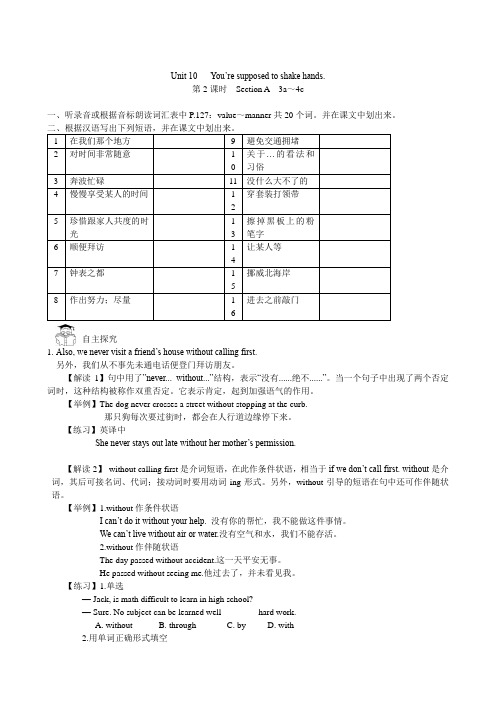
Unit 10 You’re supposed to shake hands.第2课时Section A 3a~4c一、听录音或根据音标朗读词汇表中P.127:value~manner共20个词。
并在课文中划出来。
1 在我们那个地方9 避免交通拥堵2 对时间非常随意10 关于…的看法和习俗3 奔波忙碌11 没什么大不了的4 慢慢享受某人的时间12穿套装打领带5 珍惜跟家人共度的时光13擦掉黑板上的粉笔字6 顺便拜访14让某人等7 钟表之都15挪威北海岸8 作出努力;尽量16进去之前敲门自主探究1.Also, we never visit a friend’s house without calling first.另外,我们从不事先未通电话便登门拜访朋友。
【解读1】句中用了”never... without...”结构,表示“没有......绝不......”。
当一个句子中出现了两个否定词时,这种结构被称作双重否定。
它表示肯定,起到加强语气的作用。
【举例】The dog never crosses a street without stopping at the curb.那只狗每次要过街时,都会在人行道边缘停下来。
【练习】英译中She never stays out late without her mother’s permission.___________________________________________________________【解读2】without calling first是介词短语,在此作条件状语,相当于if we don’t call first. without是介词,其后可接名词、代词;接动词时要用动词ing形式。
另外,without引导的短语在句中还可作伴随状语。
【举例】1.without作条件状语I can’t do it without your help. 没有你的帮忙,我不能做这件事情。
九年级英语全册 Unit 10 You’re supposed to shake hands(第2课时)学案 (新版)人教新目标版

Unit 10 You’re supposed to shake hands(第2课时)一、学习目标1.知识目标: 通过“应该”和“不应该”进一步了解一些国家的礼仪和对时间的看法2.能力目标: 能同他人讨论不同国家的风俗习惯,如初次见面的礼仪,餐桌礼仪等3.情感目标: 了解不同国家的时间观念,加强对中外文化的了解二、重点领悟本单元单词、短语及句子。
能用学习的知识表达自己对生活习惯的看法,养成良好的行为习惯。
be supposed to do 的用法三、自主梳理1. please try to read 3a carefully and loudly then finish the chart2. listen to 2a and 2b in Section B then check the answer3. 看2a右边的插图和左边的句子,仔细听录音内容,判断玛丽娅做错了什么。
4. 根据2a的内容,再听录音完成2b。
1. shake____过去式____过去分词2. relax____(adj)放松的,宽松的______(adj)令人放松的3. hungry(adj)______(反义词)吃饱的4. 握手______5. 顺便拜访______6. 毕竟,究竟______7. 发出令人不愉快的声音8. knife(n)______(复数)9. 某个有趣的地方__________四、合作探究I suppose everyone will volunteer否定句:反意疑问句:五、巩固训练1. 计划干某事______________2. 对……重要的____________3. 邀请某人做某事____________4. 应该做什么________5. 你们国家有什么规章制度?________________________6. 把……..插进……. __________________7. 用-------指向--------__________________8. 用-------擦----------__________________六、知识网络(1)关于否定前移:在think / believe / suppose / guess / imagine / expect等动词后跟宾语从句否定式时,应转移到主句上去,完成反意疑问句时,应与从句主、谓保持一致。
人教新目标九年级英语课件 Unit10.2学案设计
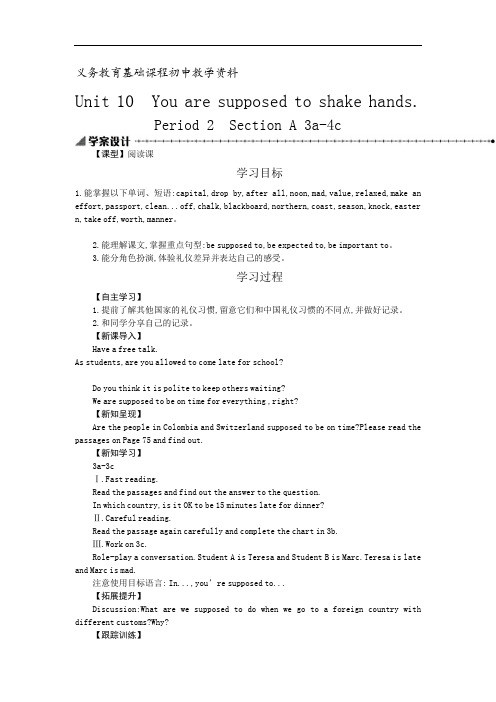
义务教育基础课程初中教学资料Unit 10 You are supposed to shake hands.Period 2 Section A 3a-4c【课型】阅读课学习目标1.能掌握以下单词、短语:capital,drop by,after all,noon,mad,value,relaxed,make an effort,passport,clean...off,chalk,blackboard,northern,coast,season,knock,easter n,take off,worth,manner。
2.能理解课文,掌握重点句型:be supposed to,be expected to,be important to。
3.能分角色扮演,体验礼仪差异并表达自己的感受。
学习过程【自主学习】1.提前了解其他国家的礼仪习惯,留意它们和中国礼仪习惯的不同点,并做好记录。
2.和同学分享自己的记录。
【新课导入】Have a free talk.As students,are you allowed to come late for school?Do you think it is polite to keep others waiting?We are supposed to be on time for everything,right?【新知呈现】Are the people in Colombia and Switzerland supposed to be on time?Please read the passages on Page75and find out.【新知学习】3a-3cⅠ.Fast reading.Read the passages and find out the answer to the question.In which country,is it OK to be15minutes late for dinner?Ⅱ.Careful reading.Read the passage again carefully and complete the chart in3b.Ⅲ.Work on3c.Role-play a conversation.Student A is Teresa and Student B is Marc.Teresa is late and Marc is mad.注意使用目标语言:In...,you’re supposed to...【拓展提升】Discussion:What are we supposed to do when we go to a foreign country with different customs?Why?【跟踪训练】Grammar Focus:Complete the sentences with the phrases in the box.1.John come to the party.2.You play football in the classroom.3.People smoke here.4.In Switzerland,it call first before you visit a friend’s house.5.people in China call when they meet their friends?【课堂练习】Ⅰ.完成句子1.What are you supposed to do?Do you know?(合并为宾语从句)Do you know to do?2.He was expected to win the game.(否定)He win the game.3.You should come here on time next time.(同义句)You come here on time next time.4.You should greet your classmates by saying“Hello”.(同义句)You greet your classmates by saying“Hello”.5.在周末你应该做什么?you on weekends?Ⅱ.Work on4a and4b.Ⅲ.Work on4c.Make a list of advice for someone coming to your country as an exchange student for the first time.课堂小结学生先自主学习,再以四人一组形式展开讨论:1.本节课学习了哪些内容?2.读完文章后,你觉得哥伦比亚人和瑞士人分别是什么样的性格特点和生活方式?自我反思1.本节课我的收获:Words and expressions:Sentences:2.学习本节后,我能用英语进行3.我的易错点:参考答案【跟踪训练】1.is supposed/expected to2.aren’t supposed to3.aren’t supposed to4.is important to5.Are;supposed/expected to【课堂练习】1.what you are supposed2.wasn’t expected to3.are supposed to4.are supposed to5.What are;supposed to do。
九年级英语人教版导学案:Unit 10 第二课时
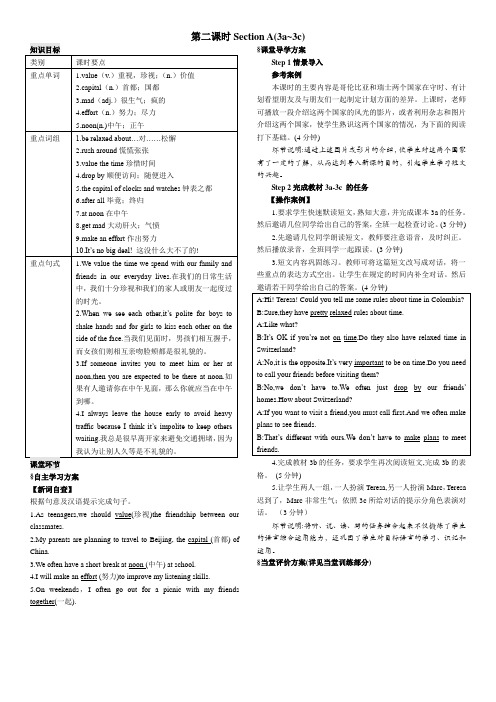
第二课时Section A(3a~3c)知识目标类别课时要点重点单词 1.value(v.)重视,珍视;(n.)价值2.capital(n.)首都;国都3.mad(adj.)很生气;疯的4.effort(n.)努力;尽力5.noon(n.)中午;正午重点词组 1.be relaxed about…对……松懈2.rush around慌慌张张3.value the time珍惜时间4.drop by顺便访问;随便进入5.the capital of clocks and watches钟表之都6.after all毕竟;终归7.at noon在中午8.get mad大动肝火;气愤9.make an effort作出努力10.It’s no big deal! 这没什么大不了的!重点句式 1.We value the time we spend with our family andfriends in our everyday lives.在我们的日常生活中,我们十分珍视和我们的家人或朋友一起度过的时光。
2.When we see each other,it’s polite for boys toshake hands and for girls to kiss each other on theside of the face.当我们见面时,男孩们相互握手,而女孩们则相互亲吻脸颊都是很礼貌的。
3.If someone invites you to meet him or her atnoon,then you are expected to be there at noon.如果有人邀请你在中午见面,那么你就应当在中午到哪。
4.I always leave the house early to avoid heavytraffic because I think it’s impolite to keep otherswaiting.我总是很早离开家来避免交通拥堵,因为我认为让别人久等是不礼貌的。
Unit10第2课时(SectionA3a-3c)(教学设计)九年级英语全一册(人教版) (1)
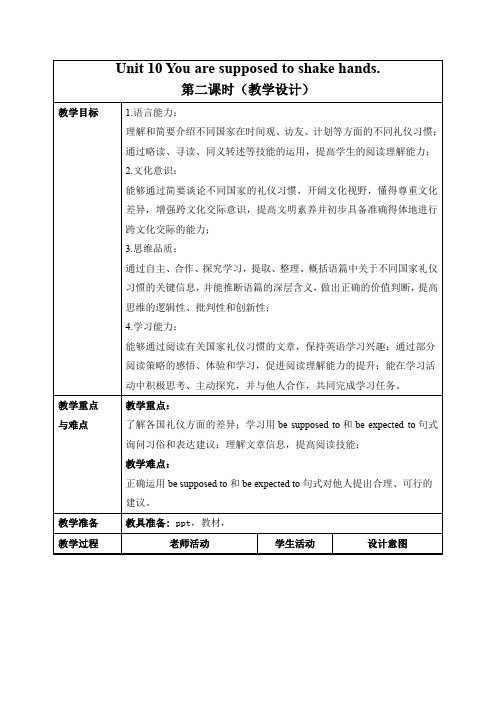
3. Roleplay a conversation. Student A is Teresa and Student B is Marc. Teresa is late and Marc is mad.
4.Encourage Ss to talk about Chinese customs.
动中积极思考、主动探究,并与他人合作,共同完成学习任务。
教学重点
与难点
教学重点:
了解各国礼仪方面的差异;学习用be supposed to和be expected to句式询问习俗和表达建议;理解文章信息,提高阅读技能;
教学难点:
正确运用be supposed to和be expected to句式对他人提出合理、可行的建议。
1.复习上一节课所学内容,巩固重点句型,引出本课新知识。
Pre
reading
(2minutes)
Lead Ss to find out where they are from and something about these two countries.
Find out where they are from and something about these two countries.
板书设计
2.Try to think what the features of their customs are
from their opinions.
3.Roleplay a conversation.
4.Try to talk about Chinese customs.
2.通过对文中主人公所在国家的不同习俗比较文化的差异。
任教版新目标英语九年级第十单元第二课时导学案
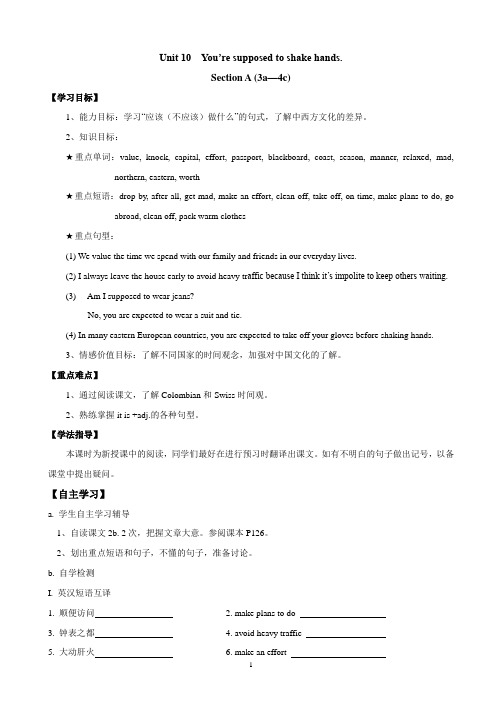
Unit 10 You’re supposed to shake hands.Section A (3a—4c)【学习目标】1、能力目标:学习“应该(不应该)做什么”的句式,了解中西方文化的差异。
2、知识目标:★重点单词:value, knock, capital, effort, passport, blackboard, coast, season, manner, relaxed, mad, northern, eastern, worth★重点短语:drop by, after all, get mad, make an effort, clean off, take off, on time, make plans to do, go abroad, clean off, pack warm clothes★重点句型:(1) We value the time we spend with our family and friends in our everyday lives.(2) I always leave the house early to avoid heavy tr affic because I think it’s impolite to keep others waiting.(3) ---Am I supposed to wear jeans?---No, you are expected to wear a suit and tie.(4) In many eastern European countries, you are expected to take off your gloves before shaking hands.3、情感价值目标:了解不同国家的时间观念,加强对中国文化的了解。
【重点难点】1、通过阅读课文,了解Colombian和Swiss时间观。
- 1、下载文档前请自行甄别文档内容的完整性,平台不提供额外的编辑、内容补充、找答案等附加服务。
- 2、"仅部分预览"的文档,不可在线预览部分如存在完整性等问题,可反馈申请退款(可完整预览的文档不适用该条件!)。
- 3、如文档侵犯您的权益,请联系客服反馈,我们会尽快为您处理(人工客服工作时间:9:00-18:30)。
Unit 10. You’re supposed to shake hands.(第二课时)Section A 3a—3c学习目标1.Knowledge AimWords: relaxed, value, capital, noon, mad, effort;Phrases: be relaxed about, drop by, after all, at noon, get/ be mad at, make plans to do …make an effort to do... It's no big dealSentences:Where I’m from, we’re pretty relaxed about time.We don't like to rush around, so we don't mind if people area little late.We often just drop by our friends’ homes if we have time.We’re the capital of clocks and watches, after all!So I make an effort to be on time when I meet my friends.2. Ability AimTo improve the reading skills3. Emotion AimTo know more about the customs in different countries and to be a polite man.重难点1.重点短语的运用2.具体语言环境中be supposed to do 的运用学习过程一、Before reading(预习检测)1.单词默写(1-4号同学必过)adj.放松的,自由的______v.重视,n.价值________n.首都,国都__________n.中午,正午___________adj.很生气,疯的__________n.努力,尽力_____________2.短语默写(1-3号同学必过)对......随意______________________慌慌张张,生活匆忙,东奔西跑_________________有点迟_______________________顺便访问__________________ 计划做某事_________________准时__________________在正午_______________大动肝火__________________努力做某事__________________没做某事_____________________没什么大不了的____________________3.词汇运用(1-3号同学必过)1.)She seemed _______ (放松) today.2.) He likes ___________ ( 顺便访问) his friend’s home on Sunday.3.)—I’m sorry I didn’t do a good job.—That’s OK. You have tried your best ________ (毕竟).4.) Beijing is the ______ (首都) of China.5.) At _____ (正午), the sun is high in the sky.6.)I got ____ (很生气的) at him for being late.7.) You should ________(努力)to study English.8.) We are _________( 计划)to do something unusual together.4.重难点指导(小组合作)1.) Where I’m from①, we’re pretty relaxed② about time.在我来的地方,对于时间相当宽松。
①Where I’m from在我来的地方,where“在……的地方”。
由“where”引导的地点状语从句。
.Where there is a will, there isa way.有志者,事竟成② be relaxed about对某事随意,宽松,不加以拘束,不严格译:不要担心,你应该放松对待考试。
2.) We don't like to rush around, so we don't mind if people area little late.我们不喜欢匆匆忙忙,所以如果人们有时晚会儿,我们不介意。
①rush around慌慌张张,生活匆忙,东奔西跑②mind doing sth. a little / a bit + adj. / adv.原级及比较级a little / a bit of +不可数名词译:当我沮丧或劳累的时候我不介意观看动作片。
3).We often just drop by our friends’ homes if we have time.如果我们有时间,我们经常顺便拜访我们的朋友。
drop by sp. / sb.= drop in on sb./ drop in at sp. 顺便访问,拜访, 一般指偶然或顺路去访问某地或拜访某人visit访问,拜访的正式用语,用于社交或公事,出于某种目的(视察,检察或访友等)译:当我叔叔来到我们城市时,他总是顺便来我家做客。
4.)We’re the capital of clocks and watches, after all! 毕竟我们是钟表之都。
after all 毕竟,终究,别忘了,到底译:不要对他要求太严格。
毕竟他还是个小孩子。
5.)So I make an effort to be on time when I meet my friends.因此当我见朋友时,我努力做到准时。
make an effort to do 努力做某事 without effort 好不费力你应该努力提高你的阅读能力。
You should make an effort to improve your reading ability.译:中国正在努力为孩子们提供更好的教育。
二.While reading1.`Scanning reading and answerWhat are the two short passages mainly about?2.careful reading and complete the chartIdeas and customsabout...Colombia SwitzerlandBeing on timeVisiting a friend’s houseMaking plans withfriends三. after readingRole-play a conversation. Student A is Teresa and Student B is Marc. Teresa is late and Marc is mad.A: Hi, Marc. Sorry I'm a little late.B: Teresa, you're 10 minutes late!A: It's just 10 minutes! It's no big deal! B: Well, in Switzerland, you're supposed to...四.SummaryThink about what you learned or misunderstand in this class 五.Exercises综合填空综合填空题方法指导:1.首先认真思考所给词汇的意思和词性。
2.读短文,根据短文意思或固定短语搭配把所给词填到句意恰当的空格处3.再读短文,检查所填词的形式是否适当和完整的短文语意是否通顺。
some, time, show, while, doing, always, inside, special, hands, spend, be, knowEvery country has its own customs (风俗) and traditions. A customis a special way of 1. something. A tradition is a customthat is passed down over 2. . These customs and traditionsmake different cultures in different countries. We should 3.about other people’s customs and cultures. And we should 4.respect (尊重) them. For example, in America, peoplewear their shoes in their homes. But in 5. Asian countrieslike Japan and Korea, people take off their shoes before going 6.their homes. In many Asian countries, people use chopsticks 7. Americans and Europeans eat with forksand knives. But in India and some other countries, people ofteneat with their 8. . There are many other differences. But allof these cultures are 9. . We should try10. and learn about them.六.HomeworkWrite a short passage about manners in Colombia and Switzerlandin 80 words.学后反思教师寄语:Different countries have different customs.When in rome,do as theromans do.。
